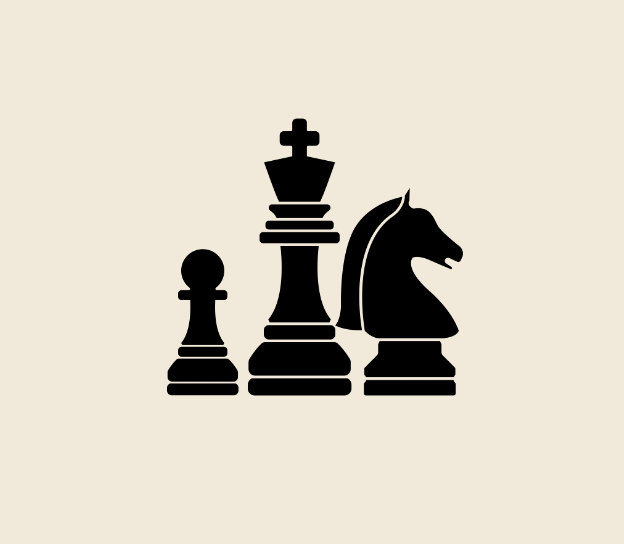
Checkmated
Every month, High Lantern Group gathers a small list of interesting, provocative, and contrarian items that shed light on what makes great strategic positioning and thought leadership. We are happy to share them with you - and hear from you about ideas worth sharing.
Six Ideas That Made Us Think
1. Remembering Evel Knievel
“Evel Knievel was one of those classic American figures who emerge from nowhere, burn consumingly, and then flame out.” So begins an epic retrospective of Knievel’s career of daredevil motorcycle jumps over cars, buses, Las Vegas fountains, and the Snake River Canyon. Paul Beston explains why Knievel's failures may have been greater than his triumphs.
The crashes Knievel suffered were a crucial part of his appeal. They were dramatic and lurid and made for great television, especially on ABC’s Wide World of Sports, a hugely popular weekend program in that analog era that provided sports-hungry males with a dose between major fixes. Knievel performances accounted for seven of the long-running show’s Top Ten-rated broadcasts, including its Number One.
2. The Blue Zone Scam
“Blue Zones” – geographic areas where the population enjoys extraordinary longevity – are ascribed to a mix of diet, ritual, and relationships. The substack Cremieux Recueil is not convinced. “The problem is that blue zones are fake.” Take the case of Sardinia:
Nearly three decades ago, it was found that the Italian government was paying out pensions to about 30,000 dead people and cutting those people off would save the Italian government between $164 and $410 million per annum ($324-$811m today). Those dead people were disproportionately exceptionally old people from Sardinia. Sardinia is not really a blue zone, it’s a fraud hotspot.
3. Checkmated
Sam Kahn writes about his “nearly-lifelong, totally-crazed, totally-overwhelming chess obsession.” Even if you’ve never played the game, you’ll understand one of his insights. Some people are successful at chess, but nothing else:
I turned out really to not be very good and so had my humbling experiences everywhere, but the clubs and streets were an initiation of a different kind. As my dad put it at the time, “You’ve already met a lot of successful people. But there are a lot of people out there who are very intelligent and just don’t succeed.” And that’s who I started coming across. There was a whole vast underbelly of these people, who could kick my ass in a game of pure mental ability, but who were living like, really, on the margins.
4. Only the Lonely
Raleigh McCool has written a confessional essay about finding community at a Nashville spin class. Even though the piece is sentimental and sometimes cringe-worthy, the deeper point is inescapable. For many, these are lonely times:
The friendship recession is upon us. I’m not alone in being alone, which knowledge does not help. I follow the results of my Google search on “how to make friends” to a T: I cohost a bowling night, join a flag football team. The bowling turnout is abysmal, and our flag football team is so bad we’ve all turned against each other.
5. The City-Suburb Debate
In a short post, economist Tyler Cowen writes: “The net American flow is toward the suburbs. That implies for most movers the average returns of suburban life are higher.” Hundreds of comments and debates quickly followed. One example:
American cities are built in ways that make them far worse than urban areas elsewhere. If you have to choose between urban St Louis and suburban St Louis, you'd have to be a pretty special person to choose the urban parts. But ask the same question of Barcelona, and the answer is completely different. The main reason to avoid the center of Barcelona is to be too poor to afford it. And last time I checked, a higher price tends to mean people want it more.
6. AI Doesn’t Value Thinking
Finally, a much-needed critique of the widespread notion that AI will usher in a golden age of productivity by saving everyone time. Eryk Salvaggio isn’t buying it:
The productivity myth suggests that anything we spend time on is up for automation — that any time we spend can and should be freed up for the sake of having even more time for other activities or pursuits — which can also be automated. The importance and value of thinking about our work and why we do it is waved away as a distraction. The goal of writing, this myth suggests, is filling a page rather than the process of thought that a completed page represents.
Websites Worth Reading
Taco Bell economics: How much a taco costs across the US
The Great Powers Index: Ray Dalio's Great Powers Index
Real-Time Crime Index: More accurate crime stats
Feeds We Follow
@NateSilver538: Election Prediction Feud Between Nate Silver and Allan Lichtman
@extremetemps: Extreme temperatures around the world
@MoreBirths: Responding to depopulation


